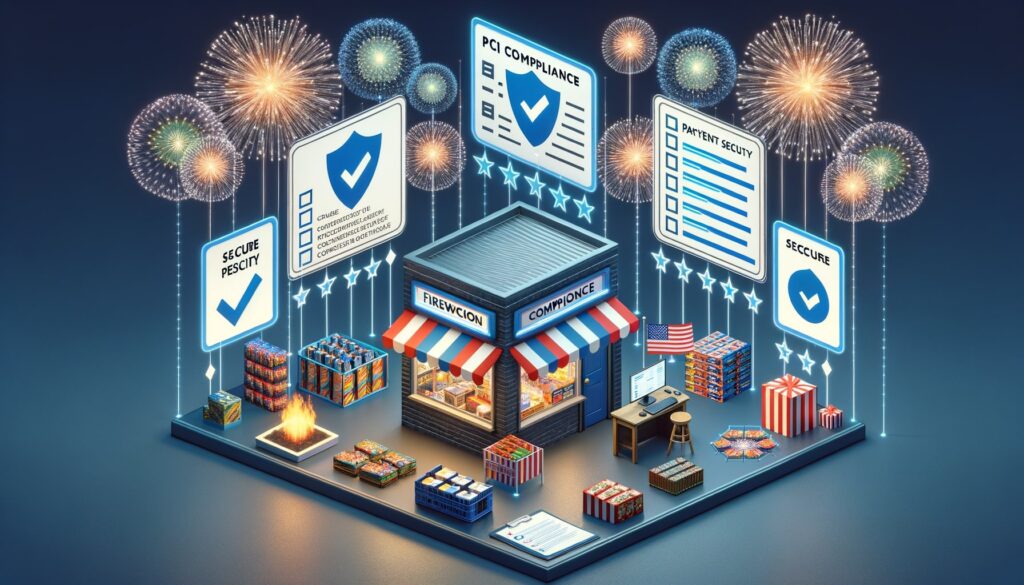
By Shelly Graves October 12, 2024
In the rapidly evolving world of e-commerce, security and compliance have become critical factors for businesses of all types, including fireworks merchants. As fireworks businesses increasingly move online or offer alternative payment options, it’s essential to protect sensitive customer data and ensure secure transactions. One of the most important frameworks that fireworks businesses need to comply with is PCI DSS (Payment Card Industry Data Security Standard) compliance. PCI compliance helps businesses safeguard customer payment data and prevent fraud.
In this comprehensive guide, we will delve deep into PCI compliance for fireworks businesses, explaining what it is, why it’s necessary, the steps required to achieve compliance, common challenges, the consequences of non-compliance, and best practices for maintaining a secure environment. By the end of this article, you will have a complete understanding of what PCI compliance entails and how it can benefit your fireworks business.
What is PCI Compliance?
PCI Compliance refers to adhering to the Payment Card Industry Data Security Standard (PCI DSS), a set of security standards designed to ensure that all businesses that process, store, or transmit credit card information maintain a secure environment. The PCI DSS was created by major credit card brands (Visa, MasterCard, American Express, Discover, and JCB) to protect cardholder data and reduce the risk of fraud and data breaches.
PCI DSS is applicable to any business that accepts card payments, regardless of size or volume. The standard outlines a comprehensive set of requirements for securing cardholder data, including implementing secure networks, encrypting sensitive information, and regularly monitoring access to systems.
Why PCI Compliance is Essential for Fireworks Businesses
Fireworks businesses are often considered high-risk merchants due to the nature of the products they sell, potential safety concerns, and strict legal regulations. This high-risk classification makes it even more critical for fireworks businesses to prioritize security and compliance, especially when handling customer payment information.
Here’s why PCI compliance is crucial for fireworks businesses:
- Protecting Customer Data: PCI compliance helps businesses protect their customers’ sensitive payment information, ensuring that it is securely processed and stored.
- Preventing Fraud: Non-compliance with PCI standards can lead to increased vulnerability to cyberattacks, resulting in fraud and identity theft. By adhering to PCI standards, fireworks businesses can reduce the risk of data breaches.
- Maintaining Customer Trust: Customers are more likely to trust businesses that prioritize data security. Compliance with PCI DSS helps build trust and credibility with customers.
- Avoiding Fines and Penalties: Businesses that fail to comply with PCI standards may face significant fines from credit card companies, along with other legal and financial consequences.
- Legal Requirements: Some regions may have laws requiring businesses to follow industry standards like PCI DSS to ensure data protection.
Key PCI DSS Requirements

The PCI DSS framework consists of 12 primary requirements grouped into six categories. These requirements are designed to secure payment card data from external and internal threats. Below is an overview of each category and its related requirements.
Build and Maintain a Secure Network
Install and Maintain a Firewall: A firewall acts as a barrier between your network and potential threats from the internet. Fireworks businesses must ensure that a robust firewall configuration is in place to protect sensitive data.
Do Not Use Vendor-Supplied Defaults for System Passwords and Security Settings: Using default passwords and settings makes it easier for hackers to gain access to systems. Businesses must change these settings to unique, strong configurations.
Protect Cardholder Data
Protect Stored Cardholder Data: Fireworks businesses should only store cardholder data when necessary and must use encryption and other security measures to protect it.
Encrypt Transmission of Cardholder Data Across Open, Public Networks: Whenever cardholder data is transmitted across public networks (such as the internet), it must be encrypted using strong encryption methods (e.g., SSL/TLS).
Maintain a Vulnerability Management Program
Use and Regularly Update Anti-Virus Software or Programs: Anti-virus software helps protect systems from malware and other malicious threats. It must be regularly updated to detect the latest threats.
Develop and Maintain Secure Systems and Applications: Businesses must ensure that all software and systems used to process payments are regularly updated and patched to fix security vulnerabilities.
Implement Strong Access Control Measures
Restrict Access to Cardholder Data by Business Need to Know: Access to sensitive data should be limited to authorized personnel only. This prevents unauthorized individuals from accessing cardholder data.
Assign a Unique ID to Each Person with Computer Access: Each employee should have their own unique login credentials to ensure that all access to cardholder data can be monitored and tracked.
Restrict Physical Access to Cardholder Data: Physical access to locations or systems where cardholder data is stored must be restricted to authorized individuals.
Regularly Monitor and Test Networks
Track and Monitor All Access to Network Resources and Cardholder Data: Businesses must use logging mechanisms to track access to sensitive data, enabling the identification of suspicious activities.
Regularly Test Security Systems and Processes: Businesses should conduct regular security tests, such as vulnerability scans and penetration testing, to identify potential weaknesses.
Maintain an Information Security Policy
- Maintain a Policy that Addresses Information Security for All Personnel: Fireworks businesses must create and maintain a formal information security policy that outlines responsibilities, procedures, and expectations regarding data security.
The PCI DSS Framework: Explained
The PCI DSS framework is a set of security standards established by the Payment Card Industry Security Standards Council (PCI SSC) to protect payment card data. It consists of twelve requirements that businesses must meet to achieve PCI compliance. These requirements cover various aspects of data security, including network security, access control, encryption, vulnerability management, and more. Understanding the PCI DSS framework is crucial for fireworks businesses to implement the necessary security measures and achieve compliance.
Steps to Achieve PCI Compliance for Fireworks Businesses

Achieving PCI compliance requires a systematic approach and adherence to the PCI DSS framework. Fireworks businesses can follow these steps to ensure compliance:
- Assess your current security measures: Conduct a thorough assessment of your current security measures to identify any gaps or vulnerabilities.
- Identify and prioritize compliance requirements: Determine which PCI DSS requirements are applicable to your business and prioritize them based on risk.
- Implement necessary security controls: Implement the required security controls to address the identified gaps and vulnerabilities. This may include network segmentation, access controls, encryption, and more.
- Regularly monitor and test security systems: Continuously monitor and test your security systems to ensure they are functioning effectively and meeting PCI compliance requirements.
- Maintain documentation and records: Keep detailed documentation of your security measures, policies, and procedures to demonstrate compliance during audits and assessments.
- Engage with a Qualified Security Assessor (QSA): Consider working with a QSA, a certified professional who can assess your compliance and provide guidance on meeting PCI requirements.
By following these steps, fireworks businesses can establish a robust security framework and achieve PCI compliance.
Common Challenges and Solutions for Fireworks Businesses
Fireworks businesses often face unique challenges when it comes to achieving PCI compliance. Some common challenges include:
- Seasonal nature of the business: Fireworks businesses typically operate during specific seasons, which can make it challenging to maintain ongoing compliance. Solutions include implementing security measures during the off-season and conducting regular audits before the peak season.
- Remote sales and mobile devices: Fireworks businesses that sell products remotely or use mobile devices for transactions face additional security risks. Solutions include implementing secure payment gateways, using encryption for mobile transactions, and regularly updating mobile devices with the latest security patches.
- Limited IT resources: Small fireworks businesses may have limited IT resources, making it difficult to implement and maintain robust security measures. Solutions include outsourcing security services, using cloud-based security solutions, and leveraging managed service providers.
- Third-party vendor management: Fireworks businesses often rely on third-party vendors for various services, such as payment processing or e-commerce platforms. Ensuring the security of these vendors is crucial. Solutions include conducting due diligence on vendors, signing agreements that include security requirements, and regularly monitoring vendor compliance.
By understanding these challenges and implementing appropriate solutions, fireworks businesses can overcome obstacles and achieve PCI compliance effectively.
Best Practices for Securing Payment Card Data
Implementing best practices for securing payment card data is essential for fireworks businesses to achieve and maintain PCI compliance. Here are some key best practices:
- Use secure payment gateways: Ensure that your payment processing systems use secure payment gateways that encrypt customer data during transmission.
- Implement strong access controls: Restrict access to payment card data to authorized personnel only. Use strong passwords, multi-factor authentication, and role-based access controls to prevent unauthorized access.
- Encrypt sensitive data: Encrypt all sensitive payment card data, both in transit and at rest. This includes cardholder data, card verification codes, and PINs.
- Regularly update and patch systems: Keep your systems and software up to date with the latest security patches to protect against known vulnerabilities.
- Train employees on security practices: Educate your employees about the importance of PCI compliance and train them on security best practices, such as identifying phishing attempts and handling payment card data securely.
- Conduct regular vulnerability scans and penetration tests: Regularly scan your systems for vulnerabilities and conduct penetration tests to identify potential weaknesses and address them promptly.
By implementing these best practices, fireworks businesses can enhance the security of payment card data and meet PCI compliance requirements.
PCI Compliance Audits and Assessments: What to Expect

PCI compliance audits and assessments are conducted to evaluate a fireworks business’s adherence to the PCI DSS framework. These audits can be performed by internal or external auditors, or by Qualified Security Assessors (QSAs) for more comprehensive assessments. During an audit or assessment, the following activities may take place:
- Review of documentation: The auditor will review the documentation provided by the business, including policies, procedures, and evidence of security controls.
- On-site inspections: The auditor may conduct on-site inspections to assess the physical security of the premises, such as access controls and video surveillance.
- Interviews with personnel: The auditor may interview employees to assess their knowledge of security practices and their adherence to policies and procedures.
- Technical assessments: The auditor may perform technical assessments, such as vulnerability scans and penetration tests, to identify any weaknesses in the security infrastructure.
- Compliance validation: The auditor will evaluate the business’s compliance with each requirement of the PCI DSS framework and provide a report detailing the findings.
It is important for fireworks businesses to be prepared for audits and assessments by maintaining accurate documentation, implementing necessary security controls, and regularly monitoring and testing their systems.
Maintaining Ongoing PCI Compliance: Tips and Strategies
Achieving PCI compliance is not a one-time event; it requires ongoing efforts to maintain compliance. Here are some tips and strategies for maintaining ongoing PCI compliance:
- Regularly review and update security policies: Review your security policies and procedures regularly to ensure they align with the latest PCI DSS requirements and industry best practices.
- Conduct periodic risk assessments: Perform regular risk assessments to identify any new vulnerabilities or changes in the threat landscape that may impact your compliance.
- Stay informed about industry changes: Stay updated with the latest developments in the payment card industry and any changes to the PCI DSS framework to ensure your compliance remains current.
- Train employees on an ongoing basis: Provide regular training to employees on security practices, emerging threats, and changes in compliance requirements.
- Monitor and log security events: Implement a robust monitoring and logging system to track security events and detect any suspicious activities or breaches.
- Engage with a Managed Security Service Provider (MSSP): Consider partnering with an MSSP to outsource some or all of your security operations, including monitoring, incident response, and compliance management.
By following these tips and strategies, fireworks businesses can maintain ongoing PCI compliance and ensure the security of payment card data.
Frequently Asked Questions
Q.1: What is PCI compliance, and why is it important for fireworks businesses?
PCI compliance refers to adhering to the Payment Card Industry Data Security Standard (PCI DSS) to protect customer payment card data. It is important for fireworks businesses as it helps prevent data breaches, builds trust with customers, and avoids financial penalties and legal liabilities.
Q.2: What are the twelve requirements of the PCI DSS framework?
The twelve requirements of the PCI DSS framework include installing and maintaining a firewall, using unique passwords and other security parameters, protecting stored cardholder data, encrypting transmission of cardholder data, regularly updating antivirus software, tracking and monitoring all access to network resources and cardholder data, regularly testing security systems and processes, and maintaining a policy that addresses information security.
Q.3: How can fireworks businesses overcome the challenge of limited IT resources?
Fireworks businesses with limited IT resources can overcome this challenge by outsourcing security services, using cloud-based security solutions, and leveraging managed service providers.
Q.4: What should fireworks businesses consider when selecting third-party vendors?
Fireworks businesses should conduct due diligence on vendors, sign agreements that include security requirements, and regularly monitor vendor compliance to ensure the security of payment card data.
Q.5: How often should vulnerability scans and penetration tests be conducted?
Vulnerability scans should be conducted at least quarterly, and penetration tests should be performed annually or after any significant changes to the network or applications.
Conclusion
PCI compliance is a critical aspect of operating a fireworks business that accepts payment cards. By understanding the importance of PCI compliance, familiarizing themselves with the PCI DSS framework, following the steps to achieve compliance, addressing common challenges, implementing best practices for securing payment card data, and maintaining ongoing compliance, fireworks businesses can protect customer payment card data, prevent data breaches, and build trust with their customers.
By staying informed, engaging with qualified professionals, and continuously improving their security measures, fireworks businesses can ensure the security of payment card data and maintain compliance with the PCI DSS framework.
